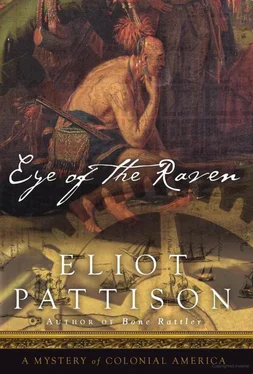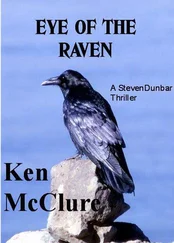Eliot Pattison - Eye of the Raven
Здесь есть возможность читать онлайн «Eliot Pattison - Eye of the Raven» весь текст электронной книги совершенно бесплатно (целиком полную версию без сокращений). В некоторых случаях можно слушать аудио, скачать через торрент в формате fb2 и присутствует краткое содержание. Год выпуска: 2010, ISBN: 2010, Издательство: Counterpoint Press, Жанр: Исторический детектив, на английском языке. Описание произведения, (предисловие) а так же отзывы посетителей доступны на портале библиотеки ЛибКат.
- Название:Eye of the Raven
- Автор:
- Издательство:Counterpoint Press
- Жанр:
- Год:2010
- ISBN:9781582437019
- Рейтинг книги:5 / 5. Голосов: 1
-
Избранное:Добавить в избранное
- Отзывы:
-
Ваша оценка:
- 100
- 1
- 2
- 3
- 4
- 5
Eye of the Raven: краткое содержание, описание и аннотация
Предлагаем к чтению аннотацию, описание, краткое содержание или предисловие (зависит от того, что написал сам автор книги «Eye of the Raven»). Если вы не нашли необходимую информацию о книге — напишите в комментариях, мы постараемся отыскать её.
Eye of the Raven — читать онлайн бесплатно полную книгу (весь текст) целиком
Ниже представлен текст книги, разбитый по страницам. Система сохранения места последней прочитанной страницы, позволяет с удобством читать онлайн бесплатно книгу «Eye of the Raven», без необходимости каждый раз заново искать на чём Вы остановились. Поставьте закладку, и сможете в любой момент перейти на страницу, на которой закончили чтение.
Интервал:
Закладка:
Duncan had not appreciated the political significance of the road. It did indeed open the western lands to Pennsylvania settlers.
"'Twas but a game. Those bucks meant to frighten, not seriously injure you," Bythe declared.
Duncan rubbed his shoulder, realizing that indeed the aches from the blows were already receding. "How could you know what they-" Duncan's question died away as the Indian wearing the fox headdress stepped to Bythe's side with a casual nod at the Quaker.
Bythe lifted a hemp bag from where it lay by his feet and extracted a slab of bacon and sack of flour, dropped them back into the bag, and handed it to the Indian. "Johantty is Skanawati's nephew," Bythe explained with a gesture toward the youth who had led the attack, "the others also from the chiefs village." As Bythe explained to Duncan, Johantty rose, glowering at Duncan, then motioned his comrades back into the shadows.
"The future of the western lands, Mr. McCallum," Bythe declared in a genteel voice, "is properly a matter between the Iroquois and the Penn province."
Duncan considered the words for a long moment, uncertain whether he was meant to take warning or invitation from them. "Would you consider it possible, sir," he ventured, "that Skanawati is innocent?"
Bythe did not hesitate. "We would consider it certain, sir," he countered, "that even if Skanawati killed a solitary Virginian that act would not explain all the other deaths along the Warriors Path this year."
Duncan stared at him in astonishment, then reminded himself that Bythe was the provincial emissary at Fort Pitt, which meant the nations he dealt with were not European.
"The surveyors Townsend, Putnam, young Cooper, and his bride," Bythe recited. "Brother Brindle and I sent out secret inquiries about them months ago."
"Skanawati himself was seeking to understand the deaths," Duncan observed.
"So my friend Long Wolf has led me to understand," Bythe said, with a gesture to the Indian in the fox headdress, still at his side. "Perhaps you have not met the chief of the Mingoes, the western Iroquois?" The chieftain nodded silently at Duncan. "He is one of those who understand our true enemy is the French. Just days before Burke's death Skanawati warned him of Hurons in the area of Ligonier."
"Yet you let your brother-in-law hold Skanawati as a prisoner.
Bythe raised a hand to cut off Duncan's protest. "Simply because he warns friends about raiders does not mean he is not secretly allied with them. That is a question we are still seeking to settle."
The two men looked at Duncan expectantly. "Does Long Wolf perhaps know of the signs on the trees?" Duncan asked Bythe awkwardly. "Conawago suggests that-"
Bythe interrupted by holding a finger to his lips, then pointed to the chieftain, who gestured for Duncan to follow toward a lodge at the rear of the camp.
Duncan hesitated as Long Wolf disappeared into the entrance of a structure made of skins draped over a framework of bent saplings.
"The fire is made and the smoke rising," Bythe said, motioning Duncan inside.
"I'm sorry?"
"It means a council has been called."
Duncan eyed the Quaker uneasily, then saw that Johantty and his companions were standing nearby, watching him, and stepped inside.
Conawago sat on the earthen floor of the makeshift shelter with Long Wolf and three other Indian elders, sharing a long stone pipe of tobacco. Knowing better than to interrupt the intense, fevered conversation that was underway, Duncan found a space and sat cross-legged on the floor, wondering for a moment why the five Indians sat in a lopsided circle, with an empty place at the far side.
The others took no notice of him and continued speaking in low, fast voices that allowed Duncan to catch only a few words, though not the sense of the overall discussion. Wolf, he heard, then tree, turtle, Onondaga, and Skanawati. The solitary life he led with Conawago gave him few opportunities to listen to conversations between Iroquois, and now as he gave up trying to make specific sense of their words, he opened himself in the way he'd been taught to listen in the forest. There was eloquence in the voices, but also something else. Conawago had told Duncan if he listened carefully he could tell the difference between the call of a young owl and an old one, for the older bird spoke with wisdom and melancholy over all the death it had witnessed. The voices he heard now were those of old owls.
He lost all sense of time and became lost in the spell of the rapid dialogue and the random images it summoned. The haunting piles of bones at Braddock's battlefield, Captain Burke nailed alive to a survey tree. The bizarre symbols, unknown to Indian or European, on the boundary trees. Mokie about to be carried away with Burke's dead body.
A touch at his knee brought him back. "Will you speak to us of what the dead man teaches?" Conawago asked.
"I'm sorry?"
"These chiefs from the Grand Council of the Iroquois have spoken about Skanawati, and his actions these past weeks. I have spoken of the events since the first day near Ligonier, of Skanawati's confession, and of the trees. They are disturbed that raiders took Burke's body. I have told them you come from a lost land, where you were taught how to make the dead speak. I told them you, too, sought out his body, touched it."
Duncan looked from one man to the next, each face as inscrutable as the one before. Even if one of their own had confessed to murder, what concerned them most was the theft of a dead body. The oldest of the Indians, whose wrinkled, leathery face spoke of great age, nodded to Duncan.
"Old Belt of the Mohawks desires you to share your knowledge," Conawago said.
The old chief extended the long pipe toward Duncan, gesturing, moving over to make room for Duncan at his side.
Only after Duncan had settled by Old Belt and inhaled deeply of the fragrant tobacco offered him did the chief speak, this time in English with a heavy French accent. "My people, guardians of the eastern door," he said, using the traditional Iroquois description of the Mohawk tribe, "are accustomed to returning from a victory with a prisoner. But never have we heard of a dead man being captured as if he were alive. Did you perhaps see that one come back to life and fight those raiders?"
The way Winston Burke, days dead now, still preyed on him, Duncan was tempted to agree. The Virginian's ghost cast a long shadow over the treaty convoy. "No. He was bound and tied inside a blanket."
"Perhaps the blanket was writhing the way a cocoon writhes just before the butterfly emerges?"
Duncan shuddered, then studied the chiefs. He was looking at the heads of the tribal treaty delegation, he realized, and now knew why there was an empty place in their circle. They still considered Skanawati an active member of their delegation. "No," Duncan said quietly. "He did not come back to life to fight the Hurons."
The chief in the fox headdress spoke at last. "Not Hurons," Long Wolf said, pronouncing his English words very slowly. "Renegades. Outlaws. What is the word when your king hires those German soldiers?"
"Mercenaries."
The Mingo chief nodded. "Mercenaries." He pointed to an object by the little fire, the bone-and-bead breastplate Conawago had found at the ambush. "This is Nanticoke, or maybe Conoy," he said, referring to two of the smaller tribes that traditionally lived along the Chesapeake and its tributaries. "Most of them have lost their ways. Some would kill for the leg of a chicken."
"But we saw them," Duncan said. "Conawago and I were at their camp. They were French Indians."
"Some were," Conawago agreed. "But not all, I think. If such men were paid to kill English, might they not be friendly with the French?"
"But who would use such killers?" As the question left his lips Duncan realized it was what the men around him had been asking themselves. By the worried glances they exchanged he realized they thought it possible it was someone within their own confederation.
Читать дальшеИнтервал:
Закладка:
Похожие книги на «Eye of the Raven»
Представляем Вашему вниманию похожие книги на «Eye of the Raven» списком для выбора. Мы отобрали схожую по названию и смыслу литературу в надежде предоставить читателям больше вариантов отыскать новые, интересные, ещё непрочитанные произведения.
Обсуждение, отзывы о книге «Eye of the Raven» и просто собственные мнения читателей. Оставьте ваши комментарии, напишите, что Вы думаете о произведении, его смысле или главных героях. Укажите что конкретно понравилось, а что нет, и почему Вы так считаете.












